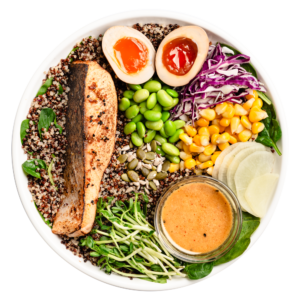When it comes to protecting your heart, the food you eat can be one of your most powerful allies. While exercise and stress management play important roles, research continues to show that specific nutrients can make a measurable difference—especially omega-3 fatty acids. Known for their heart-protective properties, these essential fats are more than just a trend; they’re a scientifically backed way to support long-term cardiovascular health through simple, everyday choices.
What Are Omega-3 Fatty Acids?
Omega-3 fatty acids are a type of polyunsaturated fat that our bodies can’t produce on their own. The three most important types include:
- ALA (alpha-linolenic acid) – found in plant-based sources like flaxseeds, chia seeds, and walnuts
- EPA (eicosapentaenoic acid) and DHA (docosahexaenoic acid) – primarily found in fatty fish like salmon, mackerel, sardines, and algae
These fats are vital for brain development, inflammation control, and, notably, cardiovascular function.
How Omega-3s Support Heart Health
Numerous studies have demonstrated the powerful impact of omega-3 fatty acids on cardiovascular health. Here’s how they help:
1. Lowering Triglycerides
High triglyceride levels can increase your risk of heart disease. Omega-3s, particularly EPA and DHA, have been shown to reduce triglyceride levels significantly—by as much as 30% in some cases.
2. Reducing Blood Pressure
Regular consumption of omega-3s has been associated with modest reductions in blood pressure, especially among individuals with hypertension. This benefit is particularly valuable, given the strong link between high blood pressure and heart disease.
3. Preventing Arrhythmias
Omega-3 fatty acids may help stabilize the heart’s electrical system, reducing the risk of arrhythmias (irregular heartbeats) that can lead to cardiac arrest.
4. Decreasing Inflammation
Chronic inflammation is a key driver of many cardiovascular conditions. Omega-3s exhibit anti-inflammatory properties that help calm systemic inflammation, offering protection against the development of atherosclerosis (plaque buildup in arteries).
5. Improving Cholesterol Levels
While omega-3s do not directly lower LDL (bad) cholesterol, they can increase HDL (good) cholesterol, contributing to better overall lipid profiles.
Dietary Sources of Omega-3s
The best way to boost omega-3 intake is through whole food sources:
- Fatty fish (at least two servings per week)
- Flaxseeds and chia seeds (perfect for smoothies or sprinkled on salads)
- Walnuts and soybeans
- Algae oil and seaweed, especially for those following a plant-based diet
- Supplements, such as fish oil or algal oil, can also be considered, particularly for individuals who don’t consume seafood regularly. However, food-first remains the preferred approach among nutrition professionals.
Making Omega-3s Part of Everyday Meals
The key to reaping the cardiovascular benefits of omega-3s lies in consistency and variety. Whether you’re enjoying a salmon poke bowl for lunch or snacking on a handful of walnuts, small choices add up.
At SaladStop!, for example, integrating omega-3 rich ingredients into bowls and salads is part of the brand’s commitment to nutritious and balanced meals. Options featuring ingredients like roasted almonds, edamame, flaxseeds, or premium sustainably-sourced tuna (such as in the Tuna San salad) provide heart-friendly nutrients without compromising on taste.
These thoughtful ingredient choices reflect a broader philosophy—making healthy eating accessible and exciting. By choosing meals that combine flavor and function, you’re not just feeding your cravings, you’re fueling your wellness goals.
Omega-3 fatty acids are one of nature’s most potent tools in the fight against heart disease. From reducing inflammation to improving lipid profiles and supporting stable heart rhythms, their cardiovascular benefits are extensive and well-documented.
Incorporating omega-3-rich foods into your diet doesn’t have to be difficult or dull. Whether it’s through home-cooked meals, smart snacking, or health-focused dining options like those available at SaladStop!, small shifts in your diet can translate into major gains for your heart.
By prioritizing nutrient-dense foods and understanding the science behind them, you’re investing in a healthier, stronger future—one delicious bite at a time. Whether you’re preparing meals at home or choosing convenient, balanced options on the go, every choice counts. For a quick, heart-healthy meal made with purposefully selected ingredients, order now at SaladStop! and enjoy food that’s good for your body and your heart.




